The realme C55, the 2023 entry to their C-series smartphones, sets the standard for how much smartphone the average end-user should be getting for an affordable price tag. Learn more in this full review.
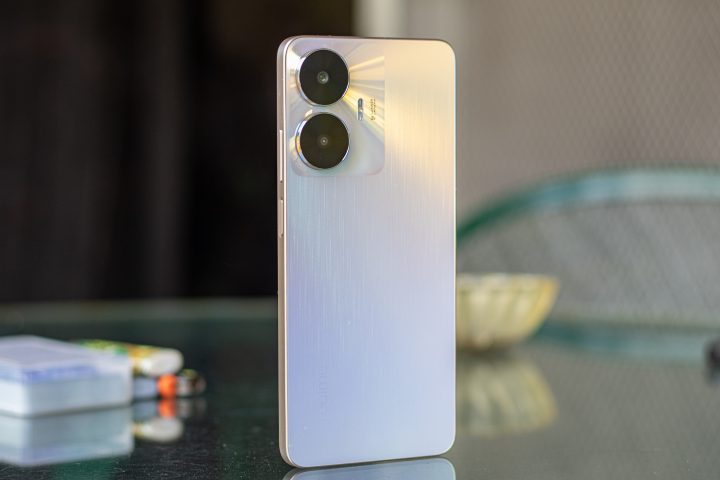
realme C55
Table of Contents
When first holding the realme C55, one can immediately notice its solid build when gripping onto its aluminum frame.
Its tall and color-accurate display makes-up for its non-asymmetrical bezels which in-turn provides a good feeling of immersion when viewing. It also features an in-display selfie camera right below the call earpiece.
Move over to the rear, and we immediately notice the two large circles on the top left embedded into the polycarbonate panel that houses the double camera setup, that’s probably compensating for how big those sensors really are. Apart from this, we have the dual-tone LED flash to their right.
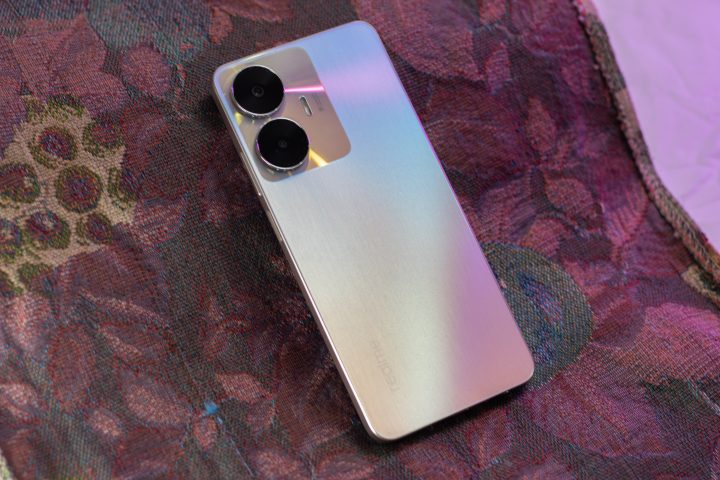
Realme C55 Rear view
For I/O, found on the left of the device is the dual SIM card tray with support for microSD card expansion. Found on the right side is the volume rocker and capacitive power-button the doubles as a side-mounted fingerprint scanner.
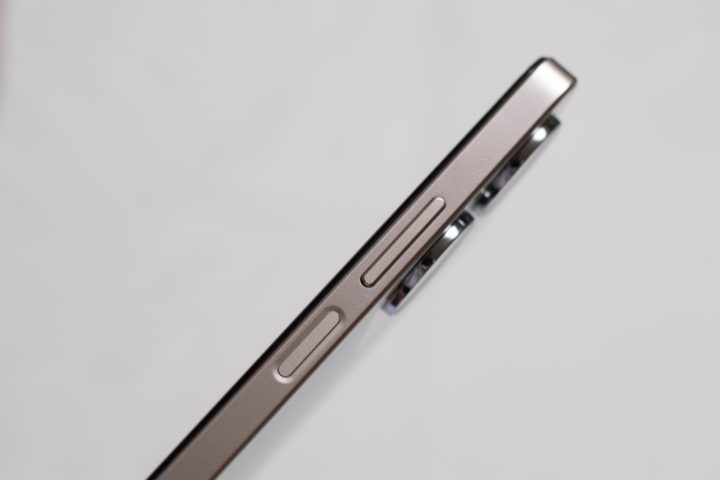
Realme C55 Right side
Lastly, at the bottom is a 3.5mm audio jack, noise-cancelling mic for calls, USB 2.0 Type-C port, and a single downward-firing mono speaker.

realme C55 bottom I/O
Overall, ergonomics feel great.
In my opinion, they could have moved the volume rocker to the left side for even better ambidextrous ergonomics. The phone is also on the taller side, although with preference in mind, this is a good thing for those who like big screens.
The realme C55 is available in 2 color options: Sun Shower and Black.
For Display, the realme C55 sports a 6.72-inch FHD+ IPS LCD display (1080 x 2400, 392 ppi) which features a 90Hz refresh rate.
Colors look accurate and with realme UI 4.0 running the show, the UI design looks vibrant for an IPS panel. This isn’t to say that it’s on par with AMOLED panels with their deep blacks and vibrancy, but it does go to show that this isn’t some cheap, washed-out looking LCD panel either.
Watching your favorite shows and movies on this phone should feel alright, especially if you’re just trying to pass-out watching something in a dark bedroom after a long day.
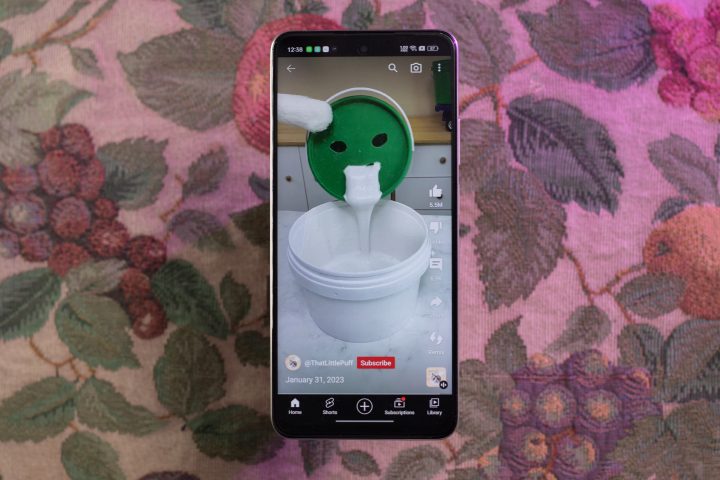
Realme C55 Media Consumption
I do recommend hooking up some wired earphones/headphones, or maybe some Bluetooth ones when using the display for media consumption; As the aforementioned single downward-firing speaker leaves a lot to be desired.
Is it usable?
–Yes it’s definitely usable for speaker calls and alike, and by definition it’s also “usable” for mixed media consumption. I just found that MONO speaker very easy to cover with my palm when holding the device in a landscape orientation.
For biometric security, the C55 features fingerprint and face unlock.
Utilizing the side-mounted scanner is a little hit or miss for me. I always have to try more than once to get the phone to unlock. This could be user error, or the fact that side-mounted scanners are made only with thumbs in mind.
And if that’s the case, side-mounted scanners have a preference for what hand you hold your phone in (which kind of sucks).
In this case, right-handed users will probably never notice what I just mentioned since they’ll most likely always be using their right thumbs to unlock their device.
Alternatively I still have face unlock to rely on, it’s not as secure but it gets the job done quick. Just don’t expect much from it when in very challenging lighting conditions.
The realme C55 sports a dual camera setup at the rear. It’s composed of a 64MP [f/1.9] main sensor, and a 2MP depth sensor.
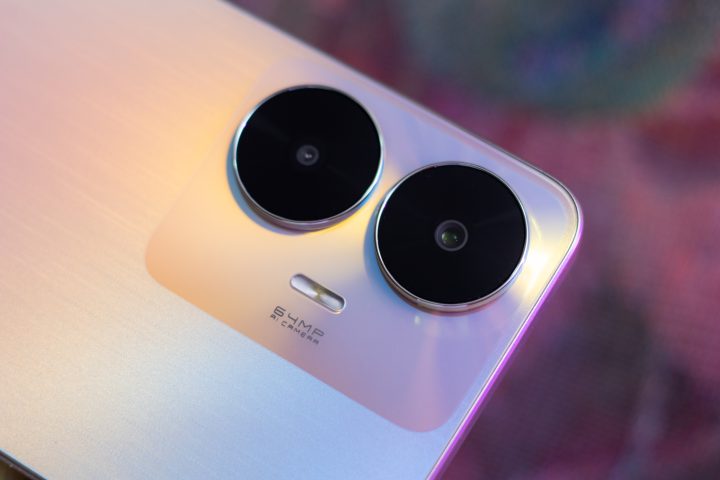
Realme C55 64MP Ai Camera
This 64MP sensor is the same one found in the realme GT Edition 12 from 2021. And we’re all for it!
It takes sharp and accurate enough photos for day-to-day social media and messaging use but can dip in quality when lighting conditions are less optimal. Color reproduction can come off a bit more saturated with the greens and blues and skin tones always seem to get a boost in luminance, most likely due to its Ai software tuning.
At this point it’s very much “realme” and I respect that it’s their color science. With that said, there is still something natural about the way realme processes their photos; white balance seems accurate to my eye and recollection. And the software likes to boost certain things like the above-mentioned.
For portrait mode, software has definitely improved from a few years back but it still isn’t perfect even with the featured 2MP depth sensor, go figure!
I believe they still could have developed an ‘as good’ portrait mode with just the main sensor through software but this is definitely still another way of achieving the same thing. I still would have appreciated either a telephoto or ultrawide here but at this price point, there’s not much to complain about.
In front we get an 8MP [f/2.0] selfie camera beneath the display. Image quality obviously isn’t as good as it’s main sensors but the processing is the same.
For video, the C55 can shoot at a resolution of up to 1080p or FHD at frame rates of 30fps and 60fps, front and back.
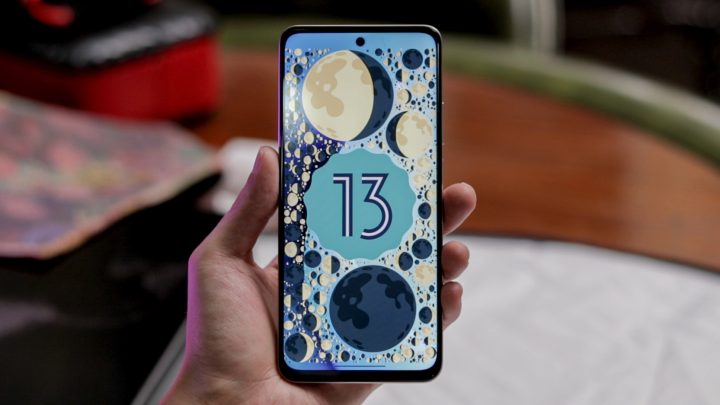
Realme C55 Android 13
Out of the box, the realme C55 boots with Android 13 skinned with realme UI 4.0 on top.
realme UI is a pretty good interface similar to Oppo’s ColorOS, their design utilizes vibrant icons that can be toned down a bit by hopping into the display settings and switching your Screen Color Mode to Natural.
I’ve grown accustomed to realme UI at this point and I usually dig through its settings for creature comforts like being able to swipe down from the home screen to access the notification drawer, and enabling lift to wake to say the least.
I still don’t like not being able to double press the lock button to shortcut to the camera, or how double tapping to lock the device only works when in the home screen. But this could obviously be but a preferential opinion at the end of the day.
Being dubbed as “the stylish-champion” it features the Mini-Capsule.
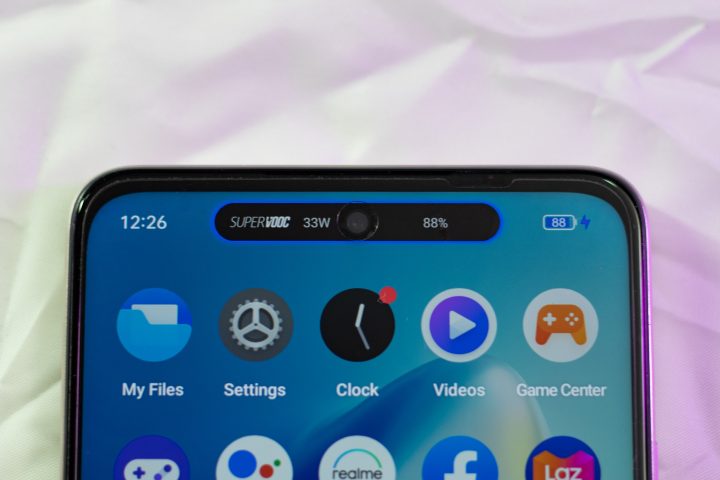
Realme C55 Mini Capsule
A UI feature from realme Labs, currently only exclusive to the realme C55. (Sorry, 10 Pro+ users)
This in turn makes it the first mass-produced Android smartphone to feature such a thing.
It somewhat integrates the front facing in-display camera with the devices UI by utilizing capsule-shaped animations to indicate battery and charging status, as well as, mobile data usage.
The folks over at realme also mentioned that C55 owners will be getting Step Tracking for their mini capsules through a future software update.
Overall, it’s a solid operating system which could still use quality-of-life optimization (depending on the device its on), so its interface animations can take advantage of its high refresh rate hardware.
This could probably be hardware limitations, but I did find that when the device transitions from 90Hz to 60Hz, it does feel a lot more choppy.
And why not enable all its native apps to run in 90Hz? Like Clock, Gallery, Weather, Music, My Files; and when typing using the default keyboard which just so happens to be Gboard?
Wherein certain apps like Settings, App Market, Internet, and even Spotify natively stay on 90Hz when in the Auto select mode of the Screen refresh rate setting.
Although most of these issues can be resolved when setting it to High, it isn’t that way by default.
One can argue that its made that way to save on battery life, but it doesn’t explain why only select native apps run on 90Hz when in Auto select. So I’m chucking this up to a lack in software optimization at the time of writing.
Then again, could this be the display hardware or its processing hardware?
The brains behind the realme C55 is a Mediatek Helio G88. A 12nm chipset that features an octa-core processor and Mali-G52 MC2 GPU.
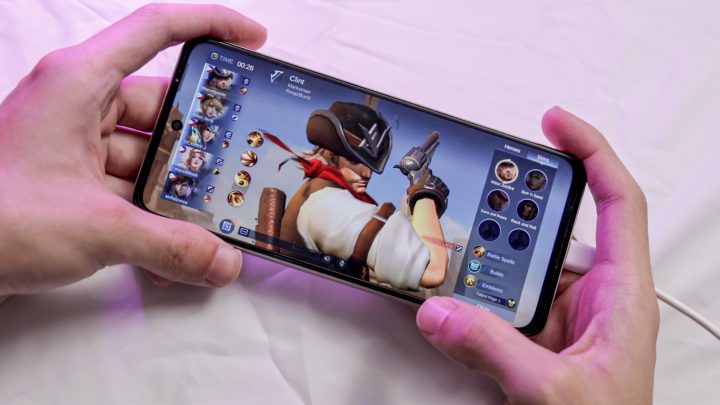
realme C55 ft. Mobile Legends
It’s a good enough midrange processor that’s perfect when you consider its price segment. So not to be too hard on this chip, but I honestly did feel some stutters in crucial moments while playing Mobile Legends. I must admit, this could have been a ping issue though.
Anything else feels fine considering the chip, and overall I would be satisfied with its performance if I were to shell-out for this one myself.
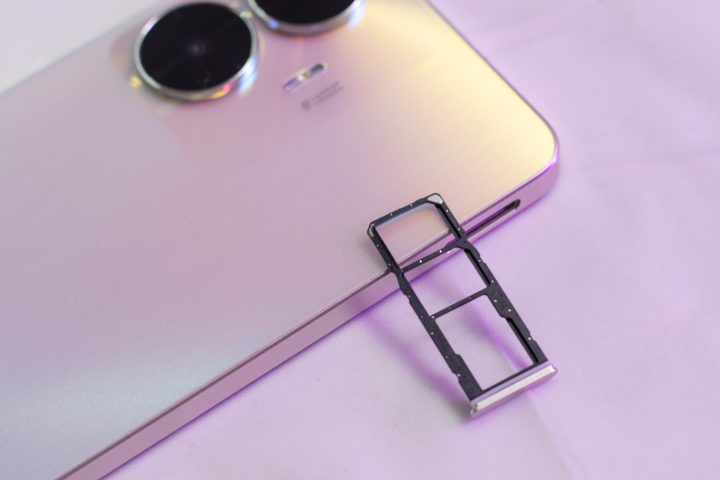
realme C55 microSD card slot
Our review unit is the top of the line configuration of 8GB of RAM and 256GB of internal storage. The C55 also features Dynamic RAM expansion of up to 8GB, and microSD card expansion of up to 1TB.
It’s also available in a 6GB RAM | 128GB ROM configuration for an even more affordable barrier to entry.
For those interested in synthetic benchmarks you can check out our results with the C55 below.
| Device: | realme C55 |
|---|---|
| Chipset: | Mediatek Helio G88 (12nm) |
| RAM | 8GB |
| Antutu v9.5.4 | 258,273 |
| Geekbench Single-Core | 421 |
| Geekbench Multi-Core | 1,383 |
| Geekbench OpenCL | 572 |
| Geekbench Vulkan | 1,097 |
| 3D Mark Wild Life | 736 (4.40 Avg FPS) |
| PCMark Work 3.0 | 7,961 |
| PCMark Storage 2.0 | 12,265 |
Similar to its predecessor, the realme C55 is powered by a 5,000mAh battery. This iteration now features 33W SuperVOOC fast charging and can charge the phone up to 50% in around half an hour.
We still get some sort of fast charging when using some spare Qualcomm Quick Charge brick lying around, but it’s definitely not as fast as the included brick.
In my 2 weeks of testing the phone, battery life was typical in the sense that I still had to charge at the end of the day, but because of the 33W fast charging it didn’t take that long either way.
This makes it practically better than my four year old flagship daily driver.
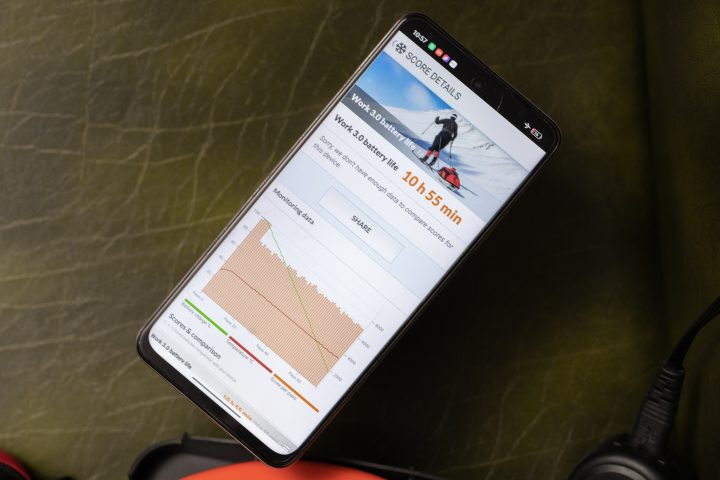
Realme C55 Pcmark Work 3.0 Battery Test result
In our PCMark Work 3.0 battery test, the C55 scored 10 hours and 55 minutes.
In our proprietary battery loop test, it lasted 12 hour and 19 minutes.
For connectivity, realme’s C55 includes 4G/LTE, Wifi, Bluetooth 5.2, GPS and NFC.
No 5G here but at this price point, we’re not complaining.
In conclusion, the realme C55 is a compelling entry to mid-range smartphone that’s priced very competitively.
It builds upon its predecessor, the C35 16, with a slew of upgraded features borrowed from their more powerful cousins, while still keeping its C-series DNA intact.
The realme C55 starts at PHP 8,999.00 for the 6GB|128GB variant and PHP 10,999.00 for the 8GB|256GB configuration.
Making it a very affordable smartphone from realme that should feel as easy as swallowing a tablet of vitamin C.
What we Liked:
What we Didn’t Like:
realme C55 specs:
6.72-inch FHD+ display 90Hz refresh rate
Mediatek Helio G88 SoC
Mali-G52 MCU
8GB RAM
256GB internal storage
GSM, HSPA, 4G/LTE
Wi-Fi 802.11 a/b/g/n/ac, dual-band
Bluetooth 5.2
GPS, GLONASS, GALILEO, BDS
NFC
64MP Main sensor (f/1.9 aperture, PDAF)
2MP depth sensor
@1080p@30/60fps
8MP Selfie (f/2.0 aperture)
@1080p@30/60fps
5,000 mAh Li-on battery, 33W SuperVOOC fast-charging
Type-C, USB 2.0
realme UI 4.0, Android 13
165.6 x 75.9 x 7.9 mm (dimensions)
190 grams (weight)

YugaTech.com is the largest and longest-running technology site in the Philippines. Originally established in October 2002, the site was transformed into a full-fledged technology platform in 2005.
How to transfer, withdraw money from PayPal to GCash
Prices of Starlink satellite in the Philippines
Install Google GBox to Huawei smartphones
Pag-IBIG MP2 online application
How to check PhilHealth contributions online
How to find your SIM card serial number
Globe, PLDT, Converge, Sky: Unli fiber internet plans compared
10 biggest games in the Google Play Store
LTO periodic medical exam for 10-year licenses
Netflix codes to unlock hidden TV shows, movies
Apple, Asus, Cherry Mobile, Huawei, LG, Nokia, Oppo, Samsung, Sony, Vivo, Xiaomi, Lenovo, Infinix Mobile, Pocophone, Honor, iPhone, OnePlus, Tecno, Realme, HTC, Gionee, Kata, IQ00, Redmi, Razer, CloudFone, Motorola, Panasonic, TCL, Wiko
Best Android smartphones between PHP 20,000 - 25,000
Smartphones under PHP 10,000 in the Philippines
Smartphones under PHP 12K Philippines
Best smartphones for kids under PHP 7,000
Smartphones under PHP 15,000 in the Philippines
Best Android smartphones between PHP 15,000 - 20,000
Smartphones under PHP 20,000 in the Philippines
Most affordable 5G phones in the Philippines under PHP 20K
5G smartphones in the Philippines under PHP 16K
Smartphone pricelist Philippines 2024
Smartphone pricelist Philippines 2023
Smartphone pricelist Philippines 2022
Smartphone pricelist Philippines 2021
Smartphone pricelist Philippines 2020